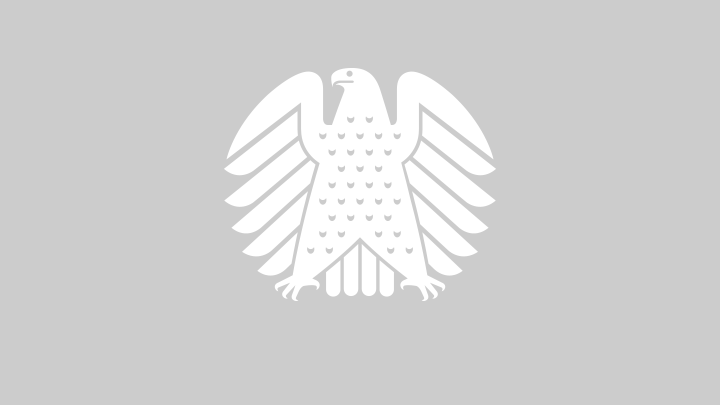The Empire (1871-1918)

Reichstag Building, designed by Paul Wallot and built from 1884 to 1894 - general view with Königsplatz and Victory Column. - Photograph, 1894 (picture-alliance / akg-images)
The German Empire was characterised by modernism and traditionalism. Its foundation marked the start of a stormy marriage between democracy and the monarchy, in which - as is apparent in retrospect - the scope for development of the Constitution of 16 April 1871 was often an issue. Was there any chance, after 1871, of a transition to a parliamentary monarchy, in which the Kaiser’s influence on affairs of state would have been reduced to a minimum, or had strict limits been drawn to prevent such a development?
Under the Constitution, the Imperial Chancellor, whom the Kaiser appointed and who was not dependent on the confidence of a parliamentary majority, was confronted by a Reichstag without the consent of which it was, in principle, impossible to enact any law and which had to approve the national budget. From 1871 the Reichstag initially met in the former Royal Prussian Porcelain Works in Leipziger Strasse. Not until 6 December 1894 did it move into the Reichstag building.
Imperial electoral law
The Reichstag had 382 members until 1874; thereafter, it had 397. They were elected for a three-year period, which was extended to five years in 1888, on the basis of a general, equal, direct and secret ballot and a first-past-the-post system of constituency seats. All male Germans over the age of 25 were eligible to vote. By the standards of the time, this electoral system was regarded as modern and progressive, even if it increasingly operated to the detriment of certain political parties. The law governing Reichstag elections played a key role in politicising the population after 1871, which is reflected not least in the steady growth in electoral turnout from 50.7% in 1871 to 84.9% in 1912.
As the German people were politicised, the political parties tended to transform themselves into modern organisations. Politicians’ working practices also took on new features. Although the payment of remuneration to Members of Parliament was prohibited until 1906, the Reichstag soon acquired numerous full-time politicians who specialised in a particular policy area in their parliamentary work. The Reichstag became a working parliament, whose extensive body of legislation played a key part in establishing a national legal and economic area as well as laying the foundations for the welfare state by creating insurance schemes for sickness, accidents, old age and invalidity.
Scrutiny of the government
Views differ very widely on the question whether this extensive legislation made the Kaiser and the Imperial Government become so heavily dependent on the Reichstag as to create a de facto situation of gradual transition to a parliamentary system of government in the Empire. The only point on which historians agree is that, after 1871, the Reichstag gained considerably in power and influence in relation to the Imperial Government and the individual states whose representatives formed the Bundesrat, or Federal Council. The majority view, however, is that the sole interest of the political parties lay in effectively overseeing the government, not in taking power, and that in any case the Empire lacked one major prerequisite for a parliamentary system of government, namely parties that were prepared to resolve even fundamental conflicts of interest in order to form durable coalitions.
The party system
The Empire had no mass parties with broad support bases transcending barriers of social class and religious creed. There were five parties, which broke down into splinter groups. In that system the parties were more or less closely intertwined, but each represented a distinct section of society, whose interests it pursued. The individual components of the party system were the German Conservatives and the German Reich Party, the Centre, which represented political Catholicism, and the National Liberal Party on the liberal Right as well as several parties of the liberal Left, including the German Progress Party, the German Liberal Party (Deutsche Freisinnige Partei), the Liberal People’s Party (Freisinnige Volkspartei) and the Progressive People’s Party, and the Socialist Workers’ Party, which was renamed the Social Democratic Party of Germany (SPD) in 1890. Although many blocs were formed between parties in the years from 1871 to 1918, these never lasted long enough to become stable ‘governing coalitions’. The parties were too much at odds to develop the rights of Parliament conclusively or even to establish a more parliamentary system of government. Moreover, apart from the SPD, which formed the largest parliamentary group in the Reichstag from 1912, no party saw any lasting benefit in constitutional change, and even within the ranks of the Social Democrats there was an ambivalent attitude to parliamentary democracy.
World war and constitutional change
Not until the final stages of the First World War in September 1918, when Germany was on the brink of economic and military collapse, did the majority parties thrust their way into government. The military high command under Paul von Hindenburg and Erich Ludendorff did not wish to take responsibility for the defeat, although in the course of the war they had increasingly determined imperial policy and had latterly done so almost dictatorially. For this reason, they were now willing to compromise with the political parties. The advances made by the majority parties and the military high command and, not least, the pressure exerted by the President of the United States, Woodrow Wilson, who did not wish to make peace with anything other than a democratic government, paved the way for the introduction of parliamentary democracy. By a large majority, Parliament amended the Imperial Constitution, and on 28 October 1918 the Empire became a parliamentary monarchy. On 9 November 1918, Philipp Scheidemann, of the Social Democrats, proclaimed the Republic from a window in the Reichstag building, thereby completing the constitutional transformation.